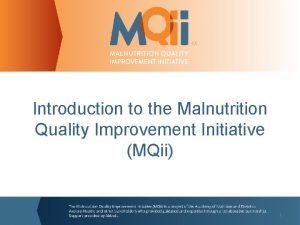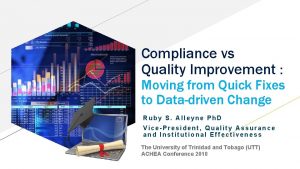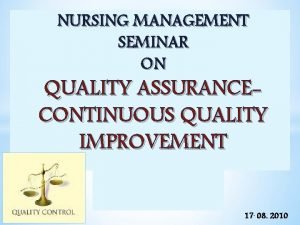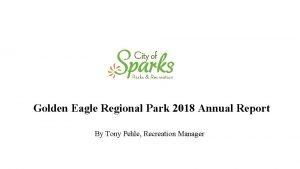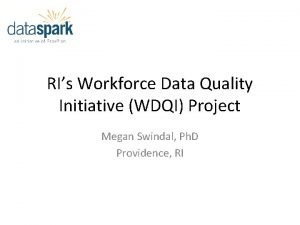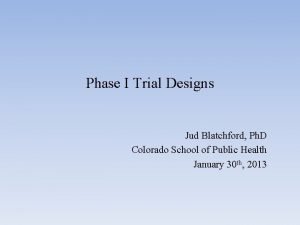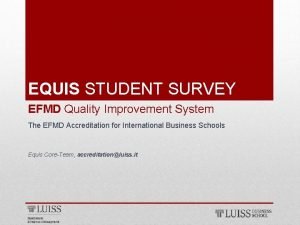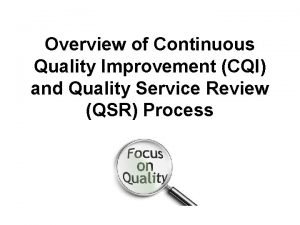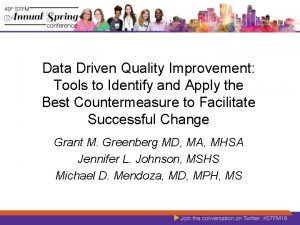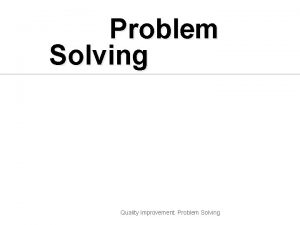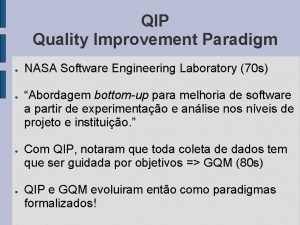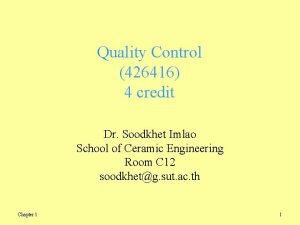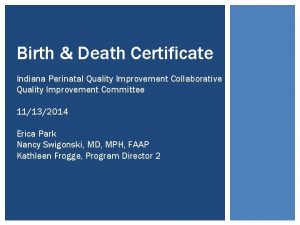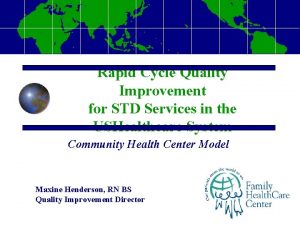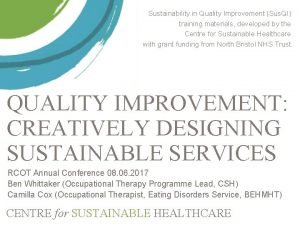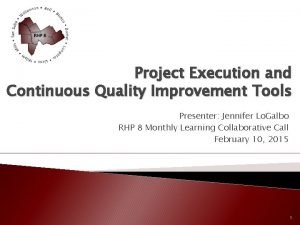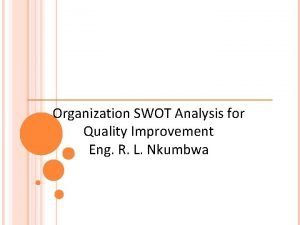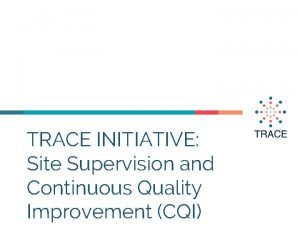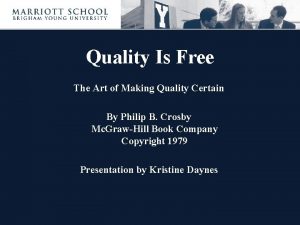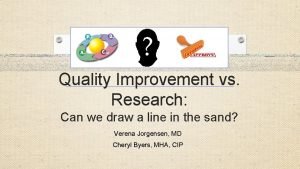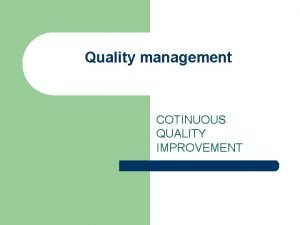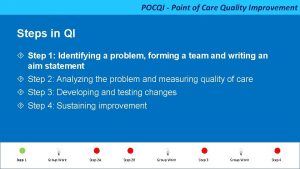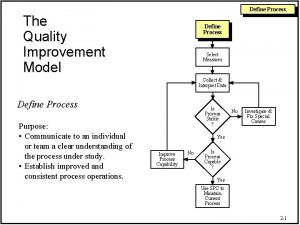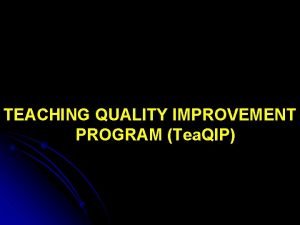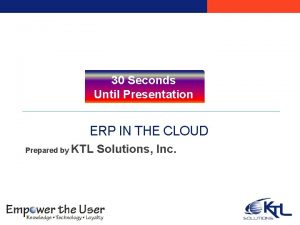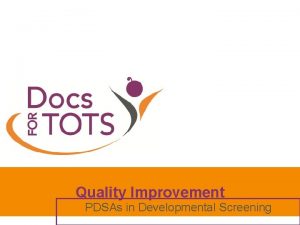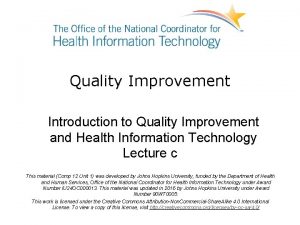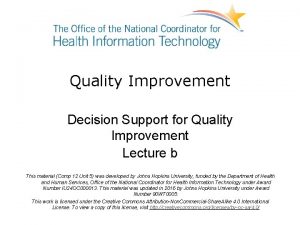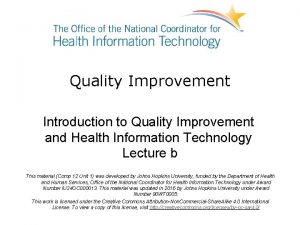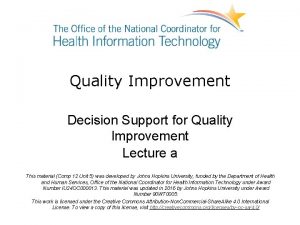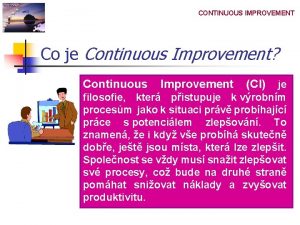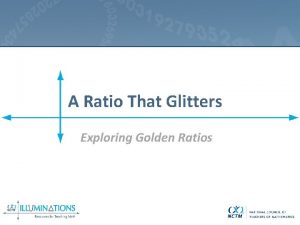Sixty Golden Minutes A Regional Quality Improvement Initiative




























- Slides: 28

Sixty Golden Minutes: A Regional Quality Improvement Initiative Paul Cawley & Nilesh Agrawal Specialty Paediatric Registrars, East of England Acknowledge: EOE Neonatal ODN First Hour of Care Working Group, I. Long, C. O’Mara, M. Dyke & all the participating neonatal staff within the East of England October 2020

Background: Management of unwell neonates in the first hour after birth has far reaching consequences beyond the immediate neonatal period In recent years an increasing number of national and international guidelines have addressed the immediate care of the preterm and sick term infant The recommendations made within these guidelines are increasingly being substantiated with grade A & B studies Standardisation of care in line with current evidence may improve neonatal outcomes EOE Neonatal ODN October 2020

Aim: In October 2014 the East of England First Hour of Care (FHOC) working group was created with the specific aims of: 1) Identifying key evidence on standards of early newborn care 2) Developing an unified region-wide FHOC admission booklet to capture key performance indicators and guide first hour care 3) Improve neonatal outcomes through improvement in standards of care across 4 related bundles of care: EOE Neonatal ODN Antenatal Thermoregulation Respiratory Fluids & Medications October 2020

Setting: East of England Neonatal Operational Delivery Network East ofrate: England Neonatal 6 Network Regional birth 17 The neonatal units spanning countiesthus provides an ideal vehicle for positive service improvement over an entire region 70, 000 per. Neonatal annum 3 tertiary Intensive Care >3, 500 births Units (2 premature paediatric surgical centres) All units work closely together and share clinical and research expertise 800 very premature. Acute neonatal transfer service By standardising care to evidence-based gold standards across an entire >200 are extremely low birth (ANTS) region there is a potential for improvement in neonatal outcomes in a weight/extremely premature significant number of infants EOE Neonatal ODN October 2020

Sixty Golden Minutes: A Regional Quality Improvement Initiative Methods & Mechanisms for Change: EOE Neonatal ODN October 2020

Mechanisms & Drivers of Change: Primary Goals Primary Drivers Develop a unified region-wide ‘Level A’ evidence; meta. FHOC admission booklet to analysis and international capture key performance guidance relating to early indicators and guide first hour newborn care The 2014 region-wide scoping survey care Secondary Drivers Staff want clarity on best practice identified significant They may witness inconsistency variation in standards of care from consensus guidelines Standardise first hour care in line with current evidence or variation in everyday practice Uniformity in practice Variation was seen between all 17 neonatal units; Level 1, across a network Level 2 & Level 3 consistency for rotating nursing and medical staff This provided Maximise neonatal survival Highly motivated staff want to compelling motivation for taking region-wide improve their patient’s outcomes & provide consistent action; Reduce the burden of neonatal support for parents co-morbidity All units motivated. Uniformity to studying their in practice – actual practice in detail reassurance for parents & to conform to best practice transferring between units EOE Neonatal ODN Staff regularly rotate between units October 2020

Cycle of Change Management: EOE Neonatal ODN October 2020

1 st Phase Region-wide ‘scoping’ survey of practice Creation of working group to undertake full literature review and develop evidence-based guidance Pre-implementation Audit Results analysed & areas for improvement agreed Creation & implementation of admission booklet and care pathway Implementation supported by: Ø Local dissemination by FHOC champions Ø Regional launch day with practical demonstrations and video lectures Ø All units offered education visits by EOEFHOC Neonatal ODN team Assessment & Interim Analysis 2 nd Phase v. Plan What [small] changes will we make [& how]? What data is needed to test outcome? v. Do Put plan into action v. Study Analyse data [frequent feedback] v. Act Adopt, modify or reject plan October 2020

1 st Phase Region-wide ‘scoping’ survey of practice Creation of working group to undertake full literature review and develop evidence-based guidance Pre-implementation Audit Results analysed & areas for improvement agreed Assessment & Interim Analysis 1 st Staff views of phase admission booklet/pathway surveyed Re-audit of FHOC practice every month for 6 months v. Plan What [small] changes What data is needed to v. Do Put plan into action v. Study Interim Analysis half-way through 6 month audit cycle Analyse data [frequen v. Act Creation & implementation of admission booklet and care pathway Implementation supported by: Ø Local dissemination by FHOC champions Ø Regional launch day with practical demonstrations and video lectures Ø All units offered education visits by EOEFHOC Neonatal ODN team 2 nd Phase Adopt, modify or rejec 2 nd phase booklet (see Fig. 3) is designed based on feedback on 1 st phase booklet October 2020

BACK PAGE MIDDLE PAGE SPREAD First Hour of Care Pathway Admission Booklet EOE Neonatal ODN FRONT PAGE

Sixty Golden Minutes: A Regional Quality Improvement Initiative Measures of Change: EOE Neonatal ODN October 2020

Pre-implementation Audit (Baseline) In March 2015 351 infants were randomly selected using anonymous ‘Badgernet’ IDsof–our all gestational audited Prior to the implementation first hour ofgroups care admission booklet, we audited region-wide clinical practice All 17 units participated: Local audit champions led data collection with intense support from a central project team and fortnightly reminders Data were collected via electronic spreadsheets with automatic data validation Amazing response!!! (351 responses : 100%) EOE Neonatal ODN October 2020

Electronic Audit Proforma: EOE Neonatal ODN October 2020

Post-implementation Audit Following the implementation of our regional FHOC admission pathway, and the regional study day, we re-audited clinical practice Ø Ø Monthly audit took place between August 2015 to January 2016 Infants randomly selected, HOWEVER, all infants <26 weeks included Over the 6 months, a total of 556 infants were audited Amazing response yet again: 100% compliance Across the pre and post-implementation audits a total of 907 infants were selected and assessed for standards of care in all 4 defined care bundles. Gestational range: 23 to 42+ weeks EOE Neonatal ODN October 2020

Study Eo. E FHC admission booklet used? (%) 100 50 0 1 2 3 4 5 6 Post implementation audit month number

Antenatal Care Bundle Percentage receiving antenatal counselling; Infant’s < 26 weeks gestation 90 80 70 60 50 40 30 Percentage receiving magnesium sulphate; Infant’s < 26 weeks gestation 47 50 79 40 30 23 20 40 10 Pre implementation 95 85 75 65 55 45 35 Post implementation 0 Pre implementation Post implementation Percentage of infants shown to parents before leaving delivery room/theatre 84 40 Pre implementation Post implementation

Fluids & Medications

Maximal Oxygen Requirement: 1 st 72 Hours After Birth Initial outcome measure: <26 weeks gestation EOE Neonatal ODN October 2020

Sixty Golden Minutes: A Regional Quality Improvement Initiative Close: EOE Neonatal ODN October 2020

Improvements seen: Good uptake of standardised paperwork to improve documentation Standardised paperwork to includes prompts for organisation, prioritisation and gold standards of care which seems to have improved: Recorded/documented antenatal counselling Use of antenatal magnesium sulphate in tertiary units Documentation & use of oxygen/air blenders at delivery Documentation & use of PEEP at delivery Use of saturation monitors to guide assisted transition Optimised dose of curosurf Baby shown to parents after birth

However: Although improved, the time from birth to starting fluids and antibiotics could still improve Too early to determine further affect on outcomes, such as incidence of BPD, ROP and neurodevelopment Persistent concerns regarding thermoregulation and aspects of antenatal care EOE Neonatal ODN October 2020

1 st Phase Assessment & Interim Analysis Region-wide ‘scoping’ survey of practice Creation of working group to undertake full literature review and develop evidence-based guidance 1 st Staff views of phase admission booklet/pathway surveyed Re-audit of FHOC practice every month for 6 months 2 nd Phase v. Plan What [small] changes What data is needed to v. Do Put plan into action What’s Next? Pre-implementation Audit Results analysed & areas for improvement agreed v. Study Interim Analysis half-way through & at completion of 6 month audit cycle v. Act Creation & implementation of admission booklet and care pathway Implementation supported by: Ø Local dissemination by FHOC champions Ø Regional launch day with practical demonstrations and video lectures Ø All units offered education visits by EOEFHOC Neonatal ODN team Analyse data [frequen Adopt, modify or rejec 2 nd phase booklet (see Fig. 3) is designed based on feedback on 1 st phase booklet October 2020

1 st Phase Assessment & Interim Analysis Region-wide ‘scoping’ survey of practice Staff views of 1 st phase admission booklet/pathway surveyed Creation of working group to undertake full literature review and develop evidence-based guidance Re-audit of FHOC practice every month for 6 months Pre-implementation Audit Results analysed & areas for improvement agreed Interim Analysis half-way through & at completion of 6 month audit cycle 2 nd Phase Target areas for improvement: Ø Full evidence based guideline commissioned to complement FHOC admission booklet Ø Implementation of 2 nd Phase admission booklet Consolidate & Educate: Ø Regional study day organised to consolidate practice development in permanent staff across all 17 units Ø Regional education session for all new paediatric trainees joining the region Creation & implementation of admission booklet and care pathway Implementation supported by: Ø Local dissemination by FHOC champions Ø Regional launch day with practical demonstrations and video lectures Ø All units offered education visits by EOEFHOC Neonatal ODN team 2 nd phase booklet (see Fig. 3) is designed based on feedback on 1 st phase booklet Ongoing audit planned following 6 month consolidation October 2020

Quick Reference Guideline: The concept: A 4 Landscape laminated (wipe clean!) & bound One to two printed copies available to each unit Online version with indexed ‘hyperlinks’ EOE Neonatal ODN October 2020

Learning points: Strong drivers for change and enthusiastic neonatal staff facilitated rapid uptake of our quality improvement drive Use of data validation and intense support during audit phases meant 100% compliance was reached across the region Involvement of all involved stakeholders is paramount to full regional engagement and improvement Further engagement of our midwifery and nursing teams is necessary to optimise antenatal care EOE Neonatal ODN October 2020

Dissemination to other trusts: Although the clinical context of this project is neonatalspecific, there are many learning points which may be generalised and disseminated to others The model of regional directed standards of care is effective where areas of expertise are replicated over multiple sites Successful audit is possible on a region-wide scale, with high levels of compliance Success pivots on: Available and willing support staff Easy to use proformas – which collect essential information EOE Neonatal ODN October 2020

Timeline: July – September 2015 ü Implementation of FHOC admission booklet ü Ongoing impact assessment ü Staff surveys: feedback on pathway ü Local education and local dissemination of FHOC practice February – April 2015 ü Pre-implementation audit ü Creation of FHOC care pathway/admission booklet August 2015 – January 2016 ü Post -Implementation Audit June 2015 ü Regional study day & launch day ü Video lectures & demonstrations ü Release of care pathway 2014 ü Region-wide scoping survey confirms variation in clinical practice ü Creation of FHOC working group to lead project to help address this June 16 ü Implementation of revised FHOC Care pathway ü First preview of FHOC guideline ü Regional study day to consolidate learning October 2020

EOE Neonatal ODN October 2020
 Mqii
Mqii Timer 1 minutes
Timer 1 minutes Coat homophone
Coat homophone Quality improvement vs quality assurance
Quality improvement vs quality assurance Quality assurance model in nursing
Quality assurance model in nursing Golden eagle regional park
Golden eagle regional park Workforce data quality initiative
Workforce data quality initiative The golden ratio
The golden ratio Modified fibonacci sequence
Modified fibonacci sequence Efmd quality improvement system
Efmd quality improvement system Define continuous quality improvement
Define continuous quality improvement Data driven quality improvement
Data driven quality improvement Quality improvement
Quality improvement Quality improvement paradigm
Quality improvement paradigm Juran 10 steps to quality improvement
Juran 10 steps to quality improvement Indiana perinatal quality improvement collaborative
Indiana perinatal quality improvement collaborative Rapid cycle quality improvement
Rapid cycle quality improvement Sustainability in quality improvement
Sustainability in quality improvement Define continuous quality improvement
Define continuous quality improvement Swot analysis quality improvement
Swot analysis quality improvement Cqi action plan template
Cqi action plan template Quality is free
Quality is free Jhm irb
Jhm irb Cotinuous
Cotinuous Point of care quality improvement
Point of care quality improvement Quality improvement
Quality improvement Tea quality improvement
Tea quality improvement What is qsen
What is qsen Quality improvement
Quality improvement
